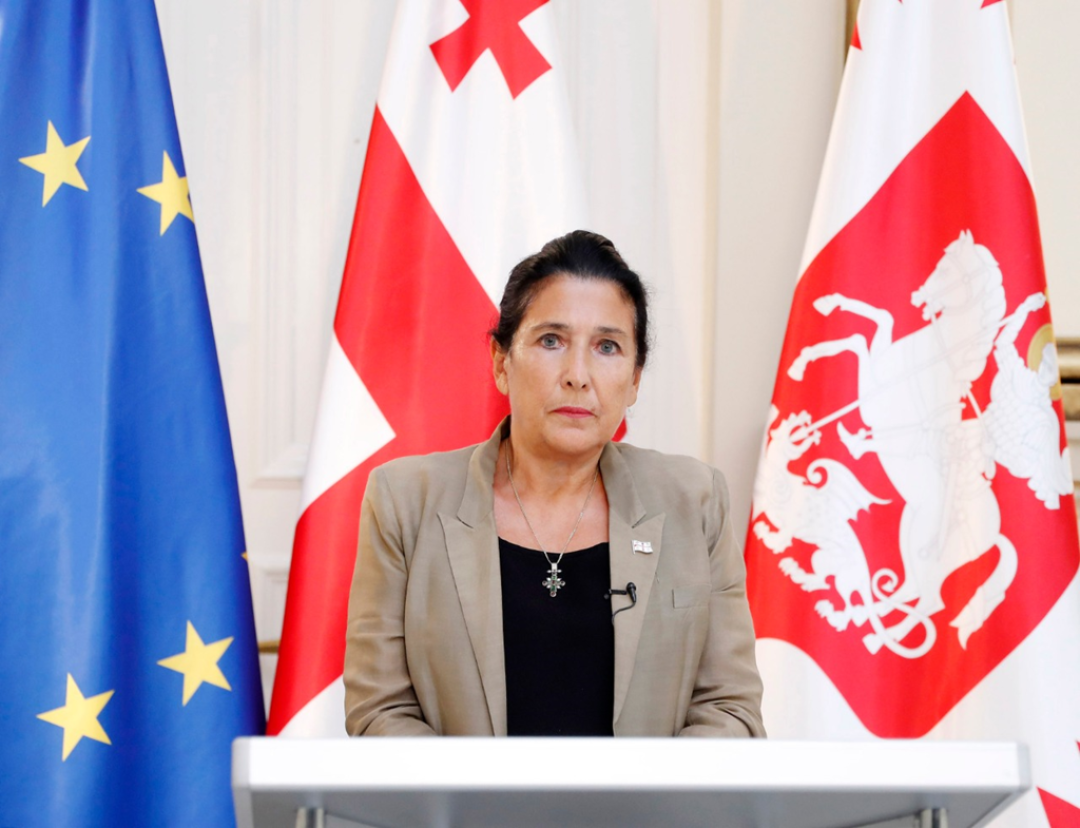
Zourabichvili Criticizes Georgian Dream, Russia's Influence; UK Sanctions Officials; Czechia Supports Opposition

On December 19, Salome Zourabichvili, the President of Georgia, gave an interview to TVP World, where she addressed Georgia's political situation, the need for stronger EU support, the ruling Georgian Dream (GD) party’s manipulation tactics, Russia's "electoral war" strategy, and her plans after her term ends.
Zourabichvili highlighted Georgia's moral and political backing from the European Union, especially from the Baltic States, Poland, Germany, and French President Emmanuel Macron, who provided "a rare direct allocation to the population." While she acknowledged the difficulty of achieving consensus among 27 EU states, she emphasized the need for more decisive action. She warned that Georgia's situation had evolved beyond "democratic backsliding" and now reflected "the imposition of a Russian model" on a country that was once a democratic leader in the region. According to her, Russia is shifting from military interventions to an "electoral war" strategy, where elections are manipulated to consolidate proxy control.
Zourabichvili criticized the GD’s ability to "intimidate" and control large parts of the population and institutions. Referring to recent elections, she stated: "It’s clear that the elections were very much stolen" and called for stronger EU intervention to address electoral manipulation. She also criticized certain EU representatives for legitimizing the GD government, whether intentionally or not. She cited the visit of Hungary’s Prime Minister as a "deliberate" move arranged between the GD and Hungary's leadership. She also criticized the Council of Europe (CoE) Secretary General Alain Berset for being "not well prepared for the type of really Soviet, Russian-like propaganda" after his meeting with GD officials.
The president also addressed the legitimacy of the new president elected under GD, describing the election process as unconstitutional and the parliament's actions as illegitimate. She argued that this new president would be used to challenge her position as a symbol of Georgia's state continuity and independence. Regarding her own future, Zourabichvili declared, "There is no question about leaving Georgia. I’m there." She dismissed comparisons to exiled opposition leaders like Svetlana Tikhanovskaya, saying she would remain in Georgia alongside its people, even under what she described as a "police state, criminal state, and Russian-type state." Recalling her family’s past experience of fleeing Russian occupation, she stated, "I’m not going to do that," signaling her determination to stay in Georgia and fight for the country's independence.
During a briefing on December 19, four opposition forces, Coalition for Change, Strong Georgia, Unity-UNM, and Gakharia for Georgia, announced a joint appeal to the OSCE/ODIHR, requesting the activation of the "Moscow Mechanism." Giorgi Butikashvili, a member of the Coalition for Change, stated that the appeal sought an OSCE mission to investigate electoral violations and violent actions by the "Russian regime." The appeal was also supported by a report from the Georgian Young Lawyers Association (GYLA) documenting repression against demonstrators. Giorgi Baramidze, a member of Unity-UNM, described the ruling GD as "Ivanishvili’s criminal and treacherous gang" and noted that EU sanctions were forthcoming. He cited the explosion of a UNM office in Gori as evidence of the regime's unwillingness to stop its crackdown.
Moreover, on the same day, the United Kingdom announced sanctions against five senior Georgian officials, including Vakhtang Gomelauri, the Minister of Internal Affairs; Aleksandre Darakhvelidze, Deputy Minister of Internal Affairs; Sulkhan Tamazashvili, Director of Tbilisi Police Department; Zviad Kharazishvili, Director of the Special Task Department; and Mileri Lagazauri, Deputy Head of the Special Tasks Department. The UK Foreign Secretary, David Lammy, stated, "The shocking violence inflicted upon protestors, opposition leaders, and journalists is an egregious attack on democracy and the Georgian people’s right to exercise their fundamental freedoms." The UK also announced the suspension of cooperation and program support to the GD government, stating that sanctions were imposed "for serious human rights violations."
During the OSCE Permanent Council meeting in Vienna on December 19, the Netherlands representative delivered a joint statement on behalf of 17 OSCE member states condemning the GD government for "brutal and unjustified violence" against peaceful demonstrators. The statement criticized the use of arbitrary detention and excessive violence and called on Georgia to release detained protesters, journalists, and opposition figures. The OSCE members reaffirmed their support for Georgia’s Euro-Atlantic aspirations, emphasizing that Georgia’s sovereignty and territorial integrity should be respected within its internationally recognized borders.
On December 19, the Czech Republic’s Foreign Ministry announced the allocation of 230,000 euros in emergency aid to Georgia’s opposition and independent media amid the crackdown on pro-European protesters. The Czech government condemned the violence against peaceful demonstrators and stated its commitment to supporting democratic forces in Georgia.
Meanwhile, Grigory Karasin, the head of the Federation Council Committee on International Affairs, criticized Zourabichvili in a Telegram post. He claimed she sought to become a historical symbol of Western values but warned that "nobody canceled the golden rule of measure." Karasin accused her of refusing to leave the presidency and attempting to build an image of intransigence while igniting street protests in Tbilisi. "The clock is persistently counting down the minutes of power and popularity," Karasin concluded.
See Also


Mirzoyan Meets US Deputy Assistant Secretary Joshua Huck

Azerbaijani President Holds Talks with UAE and German Business Delegations on Economic Cooperation

Grigoryan Confirms Armenia’s Readiness to Dissolve OSCE Minsk Group Upon Peace Treaty Signing

Azerbaijani Official Warns of Ecological Risks to Caspian Sea, Similar to Lake Urmia and Aral Sea

